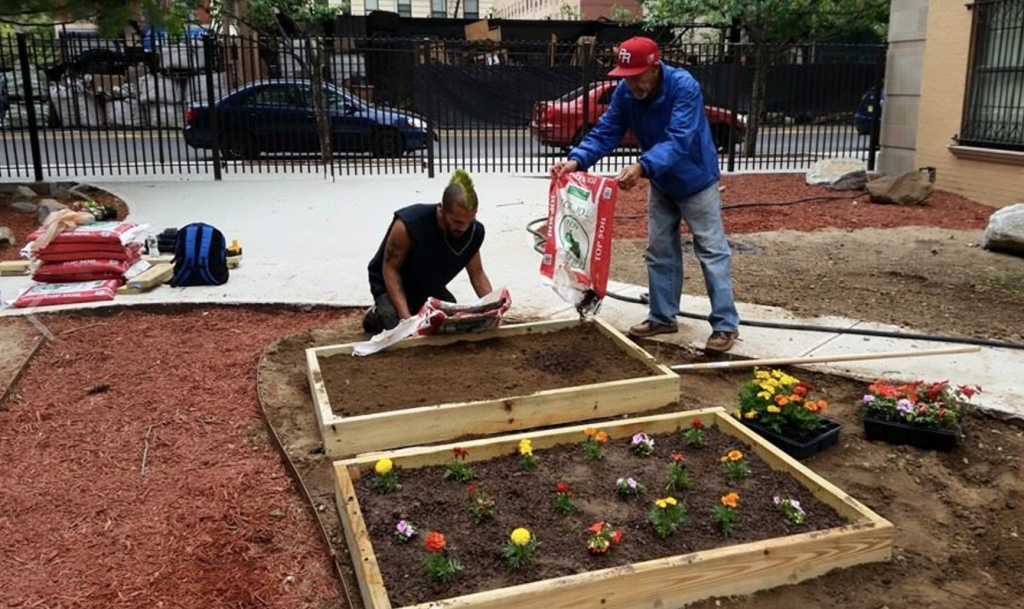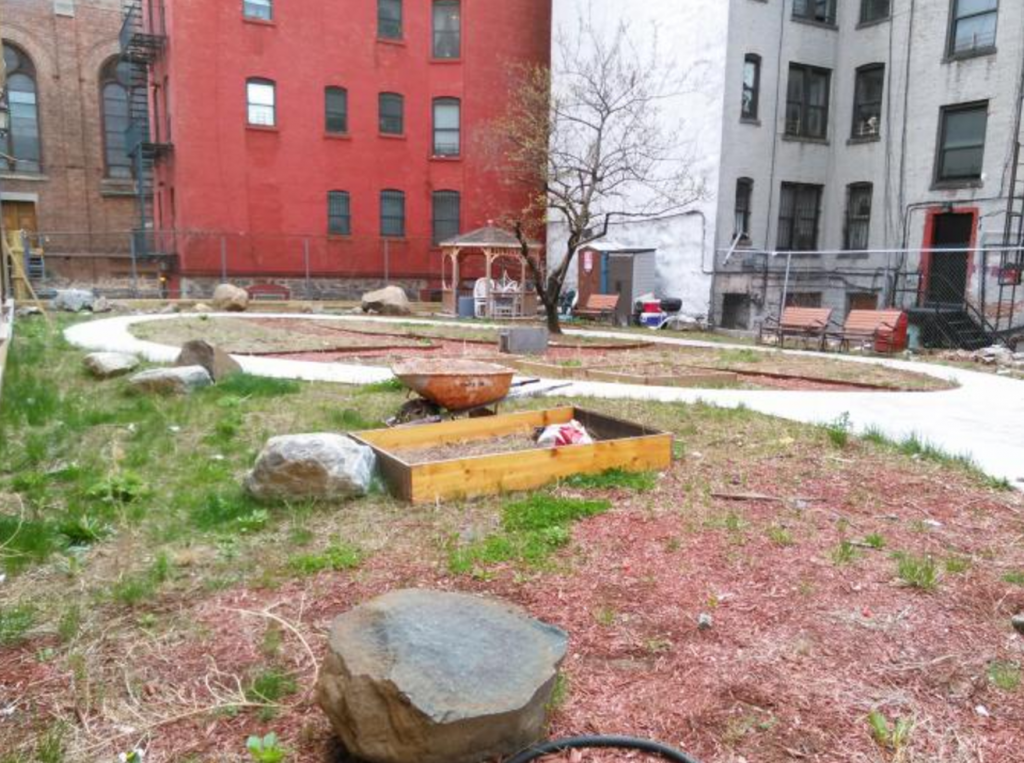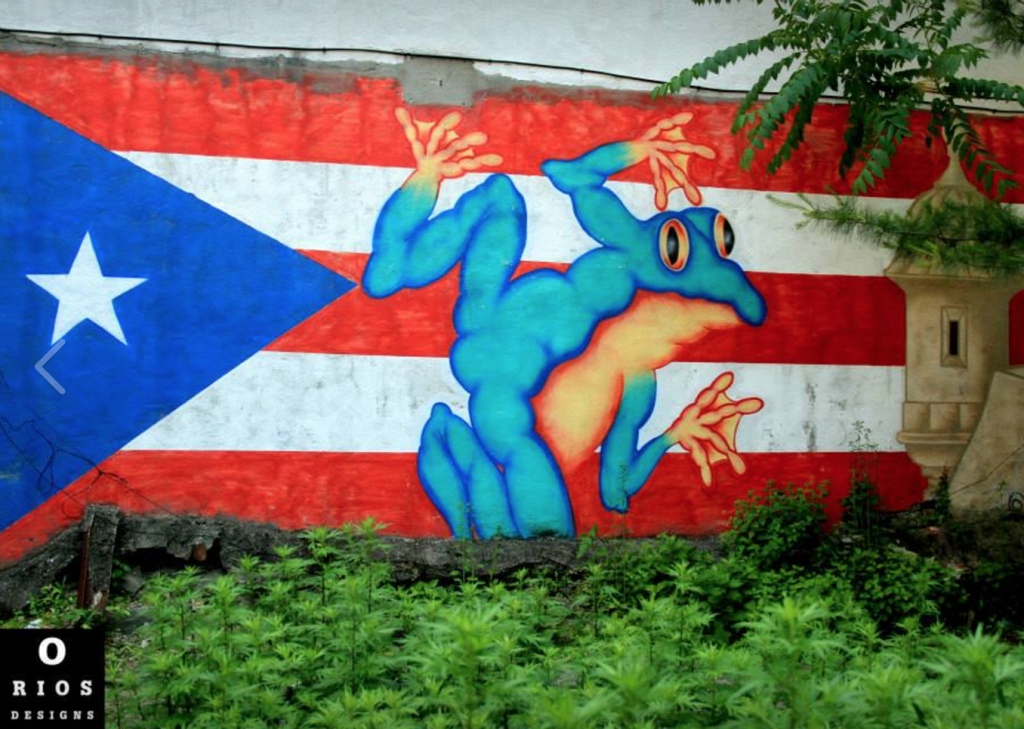With the New York State Health Foundation (NYSHealth), ioby is excited to present the second year of the Healthy Neighborhoods Challenge! Just like last year, the 2017 Challenge is supporting residents across New York State who are taking an active role in creating a culture of health where they live. To read more about how the Healthy Neighborhoods Challenge came to be, check out this blog post from last summer.
Donations to the all of this year’s participating campaigns (including this one!) will be matched dollar-for-dollar by NYSHealth through May 25. That means your gift will go twice as far to improve public health outcomes across New York!
“Those of us who participate in community gardens, we tend to connect with great people whom we ordinarily would not meet in an urban environment,” says Alicia Williamson, leader of the Healthy Neighborhoods Challenge campaign Lydia’s Magic Garden (LMG). “And we do it in a nicer way—not by bumping into them on the subway! It’s a nicer, kinder, more peaceful way to connect.”
Alicia, an East Harlem resident, is a first-time ioby leader, but a seasoned community greener: LMG will be her third garden renovation in the neighborhood since 2007. The space was initially reclaimed from its previous identity as a vacant lot about 25 years ago by Lydia Roman, another neighbor who was tired of seeing trash fill up what could be a place for community recreation and enjoyment.

[Lydia Roman in the garden; undated photo via the garden’s Facebook page.]
“She cleaned it up, as many people in different neighborhoods do where there’s a history of disinvestment and disadvantage,” Alicia says. “Now that there’s a lot more interest in these neighborhoods, we’re losing a lot of our green and open space. It’s important that we develop and integrate neighborhoods, but it’s also important to maintain these community spaces.”
In 2012, a building was built next door to LMG. Alicia says the developers took half the garden’s space, and used the rest as a staging site for their construction materials. It was never returned to a garden, and Lydia herself became too elderly to work on rebuilding it. In the past few years, Alicia and other neighbors have gotten together to bring it back to life, and are now ready to rebuild its grow beds; install a shed; plant vegetables, herbs, fruits, and flowers; and host community events there once again.

[The garden in the 1990s]
“Gardening and growing—whether it be ornamentals, herbals, medicinals, food, insect hives—is something that many people in NYC have no experience with,” Alicia says, “so it’s exciting and interesting.” After managing gardens for a nonprofit organization and a homeless shelter, as well as helping to preserve and promote community gardens in East New York, she knows firsthand the unique way these green spaces have of drawing people together. “Community gardens are known for engaging all different types of people: youth, teachers, new Americans… People just walking by, or coming from work, will stop and say, ‘Hey, what’s happening here?’ Then they pick up a shovel! Everyone gets to mingle and trade ideas.”
In addition to the social benefits, Alicia sees a strong, inherent connection between community gardening and wellness—in terms of nutrition, physical activity, and emotional wellbeing. “Health and horticulture, they go hand in hand,” she says. “For one thing, I get more exercise gardening than I would going to the gym three times a week!”

[Volunteers prepare the garden’s raised beds]
Alicia has volunteered with the Edible Schoolyard program at P.S. 7 and says that if kids see and understand where new foods come from, they’re more likely to try them and enjoy them. “This is a childhood asthma zone,” she explains. “Obesity and diabetes rates are high. I’ve worked with children in my neighborhood who live on a diet of pizza and fried chicken. They don’t have a broad experience with food, so this expands their food vocabulary. When I’ve done workshops with kids age five to twelve where they plant, grow, and eat the food, they will enjoy salad! It’s amazing! They also learn that it’s okay to leave your computer in the house, to get outdoors, to move. I think these are changes they’ll carry on for the rest of their lives.”

She also cites the benefits of being outdoors and getting physical for mental health. “I’ve worked with mentally ill people gardening, too, and you can see how wonderful it is to give them that outlet,” she says. “Improved health all around is natural byproduct of gardening.”
Alicia and her neighbors are working on partnering with P.S. 7, the veterans’ housing complex that borders the garden, and the city’s Department of Parks & Recreation to make LMG the best it can be. “We want to reinvigorate Lydia’s Magic Garden and have it be a vital part of the community again,” she says. “We want a green space—a bright space right next to the Metro-North [commuter railroad], where there’s not much else to see—but also a space for programming and recreation. This is an opportunity to make something really nice, and in two or three years, we’ll be able to just sit back and watch the plants grow. There will be a great sense of accomplishment and satisfaction.”

While Alicia says she’s been pleasantly surprised by the steady stream of contributions to the ioby campaign—some of which have come from former NYC community gardeners who’ve since relocated but still appreciate the effort—she explains that the site’s success doesn’t depend only on money. “It’s also about participation,” she says. “At some point, after you get it set up, the need for funding drops off, but people contribute in different ways: often by just using it! Or by setting up cultural events and holding celebrations. You can be involved steadily, or just once, but people coming together is a big part of sustaining a place like this.”
Ultimately, Alicia sees Lydia’s Magic Garden as a conduit for gathering and exchanging ideas. “Many community gardens in NYC serve that function of sustaining long-term connections in the community,” she says. “That’s unlike Central Park—which is beautiful—but people don’t go there to connect. You’re more isolated. This will be more of a coming together.”